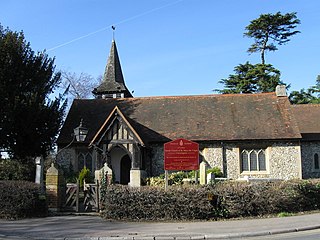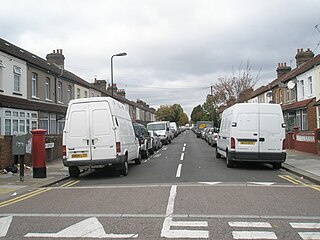Related Research Articles

Emma is a novel written by English author Jane Austen. It is set in the fictional country village of Highbury and the surrounding estates of Hartfield, Randalls and Donwell Abbey, and involves the relationships among people from a small number of families. The novel was first published in December 1815, although the title page is dated 1816. As in her other novels, Austen explores the concerns and difficulties of genteel women living in Georgian–Regency England. Emma is a comedy of manners.
A resulting trust is an implied trust that comes into existence by operation of law, where property is transferred to someone who pays nothing for it; and then is implied to hold the property for the benefit of another person.

Balfour v Balfour [1919] 2 KB 571 is a leading English contract law case. It held that there is a rebuttable presumption against an intention to create a legally enforceable agreement when the agreement is domestic in nature.

D & C Builders Ltd v Rees [1965] EWCA Civ 3 is a leading English contract law case on the issue of part payment of debt, estoppel, duress and just accord and satisfaction.

English trust law concerns the protection of assets, usually when they are held by one party for another's benefit. Trusts were a creation of the English law of property and obligations, and share a subsequent history with countries across the Commonwealth and the United States. Trusts developed when claimants in property disputes were dissatisfied with the common law courts and petitioned the King for a just and equitable result. On the King's behalf, the Lord Chancellor developed a parallel justice system in the Court of Chancery, commonly referred as equity. Historically, trusts have mostly been used where people have left money in a will, or created family settlements, charities, or some types of business venture. After the Judicature Act 1873, England's courts of equity and common law were merged, and equitable principles took precedence. Today, trusts play an important role in financial investment, especially in unit trusts and in pension trusts. Although people are generally free to set the terms of trusts in any way they like, there is a growing body of legislation to protect beneficiaries or regulate the trust relationship, including the Trustee Act 1925, Trustee Investments Act 1961, Recognition of Trusts Act 1987, Financial Services and Markets Act 2000, Trustee Act 2000, Pensions Act 1995, Pensions Act 2004 and Charities Act 2011.

Gissing v Gissing [1970] UKHL 3 is an English land law and trust law case dealing with constructive trusts arising in relationships between married couple. It may no longer represent good law, since the decisions of Stack v Dowden and Jones v Kernott.

Merritt v Merritt [1970] EWCA Civ 6 is an English contract law case, on the matter of creating legal relations. While under the principles laid out in Balfour v Balfour, domestic agreements between spouses are rarely legally enforceable, this principle was rebutted where two spouses who formed an agreement over their matrimonial home were not on good terms.
Cobbe v Yeoman's Row Management Ltd[2008] UKHL 55 is a House of Lords case in English land law and relates to proprietary estoppel in the multi-property developer context. The court of final appeal awarded the project manager £150,000 on a quantum meruit basis for unjust enrichment because Yeoman's Row had received the benefit of his services without paying for that. The court refused to find or acknowledge a binding contract, prior arrangement with a third party or promise, overturning a £2m award on the basis of a possible lien arising from a promise over the property. The court found a non-binding agreement in principle, entirely subject to the owner's final say to take into account for example their view of the market; this was the basis on the facts on which the parties were proceeding.

Hussey v Palmer [1972] EWCA Civ 1 is an English trusts law case of the Court of Appeal. It concerned the equitable remedy of constructive trusts. It invokes the equitable maxim, "equity regards the substance and not the form."

Re Vandervell Trustees Ltd [1974] EWCA Civ 7 is a leading English trusts law case, concerning resulting trusts.

Resulting trusts in English law are trusts created where property is not properly disposed of. It comes from the Latin resultare, meaning to spring back, and was defined by Megarry VC as "essentially a property concept; any property that a man does not effectually dispose of remains his own". These trusts come in two forms: automatic resulting trusts, and presumed resulting trusts. Automatic resulting trusts arise from a "gap" in the equitable title of property. The equitable maxim "equity abhors a vacuum" is followed: it is against principle for a piece of property to have no owner. As such, the courts assign the property to somebody in a resulting trust to avoid this becoming an issue. They occur in one of four situations: where there is no declaration of trust, where an express trust fails, where there is surplus property, or upon the dissolution of an unincorporated association. Rules differ depending on the situation and the type of original trust under dispute; failed charitable trusts, for example, have the property reapplied in a different way from other forms of trust.
Bristol & West Building Society v Henning [1985] EWCA Civ 6 is an English land law case that holds a person can consent to give up the right to an overriding interest in land, that will bind third parties, such as banks, that purchase a property. Although dealing with unregistered land, it is equally applicable in the case of registered land and now falls under the Land Registration Act 2002.

Chhokar v Chhokar [1984] FLR 313 is an English land law case concerning constructive trusts law and widening the natural meaning of "actual occupation". The facts of the case showed an intention to do a woman out of her occupational interest in a matrimonial home, as the new co-owner buying his share from the husband knew of her situation from the outset and wished to resell the property. The court confirmed in these exact circumstances her interest was overriding at the time when she was in hospital and it was a constructive trust.
Midland Bank plc v Cooke [1995] is an English land law case, concerning constructive trusts; and at first instance proven undue influence in law as to a secured business loan and later refinance.

Pennington v Waine[2002] EWCA Civ 227 is an English trusts law case, concerning the requirements for a trust to be properly constituted, and the operation of constructive trusts. The case represents an equitable exception to the need for a complete transfer of property in law.

Binions v Evans[1972] EWCA Civ 6 is an English land law and English trusts law case, concerning a constructive trust of land which will often be irrevocable whilst the occupier is in occupation as opposed to a licence to occupy — and/or a tenancy at will which is similar save that without transfer of the underlying property it can be revoked without cause. The case hinged on the fact there was an agreement specifying the existing occupier was to remain.

Pascoe v Turner [1979] 1 WLR 431 is an English land law case, a case of proprietary estoppel.

The Bennet family is a fictional family created by the English novelist Jane Austen in her 1813 novel Pride and Prejudice. The family consists of Mr and Mrs Bennet and their five daughters: Jane, Mary, Catherine, Lydia, and Elizabeth, who is the novel's protagonist.
Repington v Roberts-Gawen (1881–82) LR 19 Ch D 520 is a leading English trust law case, concerning the requirement of intention to create a trust, and the requisite level of certainty in the beneficiaries.

CIBC Mortgages plc v Pitt[1993] UKHL 7 is a decision of the House of Lords relating to undue influence. The decision confirmed that a person did not need to suffer "manifest disadvantage" under a transaction in order to challenge it for actual undue influence.